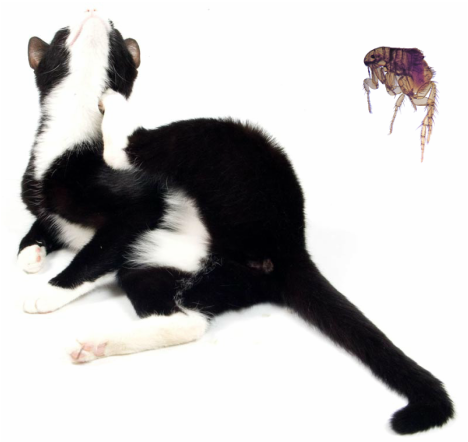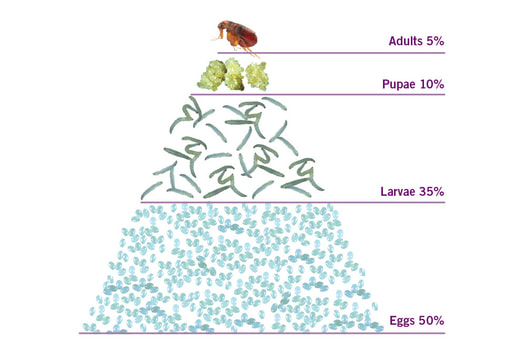Effective flea prevention and control depends not only on killing the adult fleas on your cat but more importantly also killing eggs, larvae and pupae in the environment (your home!) before they can develop into adult fleas and re-infest your cat.
Traditionally this has involved treating both your cat (with an insecticide product to kill the adult fleas) AND treating the house with a spray insecticide. Most people are not keen to spray their house with chemicals and so have turned to what seems like the easy option: "spot-on" style products for their cat.
Traditionally this has involved treating both your cat (with an insecticide product to kill the adult fleas) AND treating the house with a spray insecticide. Most people are not keen to spray their house with chemicals and so have turned to what seems like the easy option: "spot-on" style products for their cat.
Many cat people mistakenly think their cat's fleas have become "resistant" to certain spot-on products. The problem is not necessarily with the products but a lack of understanding of the flea lifecycle. If you are seeing live fleas or flea dirt either in your house or on your cat then this is the tip of the iceberg and a budget flea spot-on is not going to solve the problem.
Low cost flea control options kill some of the adult fleas at best and only those that happen to hop onto your cat. In reality this means any fleas that don't come into contact with your cat will continue to reproduce. With each flea laying over 30 eggs in one day alone, that's a lot of future fleas! Even the better brands of "over the counter" spot-on products will be struggling as they still only target adult fleas so fail to address the eggs, larvae and pupae laid in your house. If these are left untreated, then within a couple of months, a whole new surge of young adult fleas will appear - at this stage owners become frustrated.
The silent video and diagram below really puts this into perspective!
Essentially, what this means in real terms is that over-the-counter flea control products are at best going to treat 5% of the problem!
To get to the bottom of any flea problem, you need a product that targets more than just the adult fleas whilst being safe for your cat. This is where vet-only prescription products and the advice that comes with them comes into its own. It is best to talk to your vet and use products that will treat the problem properly from the outset rather than waste money on cheap, over the counter sprays, collars or spot-on solutions that will only address the tip of the flea "iceberg",
Preventing a Flea Problem
- Treat cats (and any dogs) regularly with a dual-action product from your vet
|
There are so many excellent products available from vets that work effectively against the multiple stages of the flea life-cycle and are available in one easy-to-give solution. Some formulations even kill adult fleas within 30 minutes to 4 hours of dosing - so much faster than some of the older style treatments. There are both spot-on type products and tablet options. Only these prescription only medications are capable of providing the best level of protection against these frustrating little parasites. The benefits of these products and the quality of advice you receive by buying flea control from your vet far outweighs the price and risk of products that are available over-the-counter in supermarkets and pet shops.
|
- Regularly washing anything your cat sleeps on above 60*C to kill flea eggs and larvae (eg pet beds, blankets, your own bedding)
- Regularly vacuum your home to physically remove as many fleas and their eggs/larvae/pupae
|
Fleas love dark areas so take extra care to vacuum their favourite hiding spots - corners of rooms, down in front of skirting boards, sofas (behind & beneath, remove any cushions and vacuum underneath). Beat any cushions and rugs outside. NB: Always remember to take the vacuum straight outside and empty the contents into a bag and tie up and dispose of immediately to prevent all the fleas from hopping their way back into the house!
|
Tackling an existing flea infestation
All the preventative tips above still apply PLUS...
- Remember to allow treated pets access to all infested areas. This might seem instinctively wrong as it is a revolting thought that fleas might get into your bedrooms; however, if your cat visited those rooms before you noticed the fleas, then there will no doubt be infestation in those rooms already. By letting your treated cat revisit those rooms you will optimize the chances of the treatment you have applied working against the eggs, larvae and pupae within these areas. Any emerging fleas need to jump onto your cat to be killed by the treatment - if you close the doors this can't happen so the little critters will start biting you instead!
- Environmental sprays are available for use on carpets and other soft furnishings. They usually contain pesticides that kill the adult fleas, but some contain an insect growth regulator (IGR) that kills flea larvae and prevents development of eggs too. The length of effect of these products varies from minimal residual effect, right up to 12 months. Always read the labels and keep pets clear of treated areas as per the instructions on the product. Use the spray carefully as some of the products available can be harmful (particularly to birds/fish) or can make furnishings/floors slippery (eg silicone-based sprays).
Why you should consider regular preventative flea treatment all year round...
- Fleas like warm conditions so many UK cat owners assume fleas are a summer problem, but with modern central heating, the risk of flea infestation is a year long problem.
- It can take many months (sometimes up to a year) to get on top of a flea infestation so many owners who have experienced a flea infestation before prefer the reassurance of using regular preventative treatment all year round.
- Fleas can also carry worms so to protect your cat and your family from disease, regular flea and worm control is recommended.
Here is a link to a fantastic resource with everything you'll need to know about tackling fleas in cats from iCatCare
If you have any further questions, please contact me for more details.
If you have any further questions, please contact me for more details.







